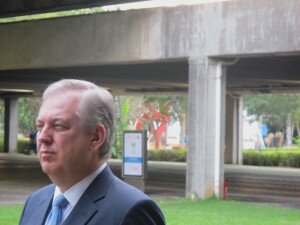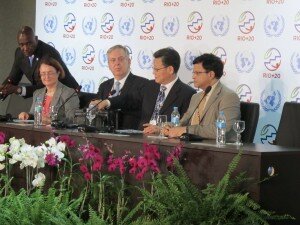Rio+20: Too much to be done
Sergio Abranches
Today has began the final meeting of Rio+20 preparatory committee. Negotiators arriving at the Riocentro convention center already know they have to do in seven days what they weren’t able to accomplish in several weeks at the “informal-informal” consultations in New York City. The deal is not done, the core of the resolution remains without an agreement. They are expected to deliver a fully agreed, and minimally significant document of resolutions to the chiefs of state by June 20.
Brazilian chief-negotiator ambassador Luiz Alberto Figueiredo told me that, although there remains a lot to negotiate, it is already agreed in principle that the leaders will announce global sustainable development goals at the close of the summit. The resolution will contain a mandate for the countries to develop these goals, set quantitative targets, and a timetable for the job to be done, as well as a timeline for the pursuit of these goals, starting in 2015. “We will not define the goals in Rio, but we will deliver an outcome commensurate with the historical importance of this summit”, he said.
Korean ambassador to the UN, and co-chair of the preparatory committee, has warned negotiators on a welcome letter that “there remains areas where there is still no agreement and where more discussions are necessary”. He also stated that “time is of the essence”, and “we all know what is at stake. And he concluded: “The World is watching us. We need to deliver!”
On the inaugural press briefing, ambassador Luiz Alberto Figueiredo and the Secretary General of Rio+20 Sha Zukang have had very little to say. But they made it clear they’re betting on an agreement on the principles that will start a process for the definition of global sustainable goals, and respective quantitative targets. Sha Zukang even hinted at some areas they would cover such as poverty erradication and oceans integrity, He said it will be a politically, though not legally, binding decision. Figueiredo stressed that legal instruments are already in place since Rio 92, what is needed now is to start a process of integral fulfillment of the mandates from these legally binding instruments. Rio 92 closed a phase, Rio+20 will open a new one, he repeated. For this new phase, what is crucial are the meanings of implementation. This phrase is a password for finance and science and technology. According to Figueiredo this is a problem because of the European crisis: “donor countries are in economic and financial stress and are facing difficulties to keep past commitments, and even more reluctant to assume new ones”. G77/China is asking for a fund for sustainable development of US$ 30 billion a year starting in 2015.
Sha Zukang has admitted that, frankly speaking, there are important deadlocking issues, negotiations are intense, and negotiators should focus on the harder issues. “Let’s use these final days to turn our most aspirational visions – of prosperity, equality, inclusion, opportunity and social responsibility – into reality,” he concluded.
There are hard choices to make, too much to negotiate and too little time. All one could expect is a set of principles, and a platform from which to development global sustainable development goals over the next two years. The best outcome would be a strong, affirmative, and clearly defined set of principles. The lesser one, a set of vague, compromising principles.





